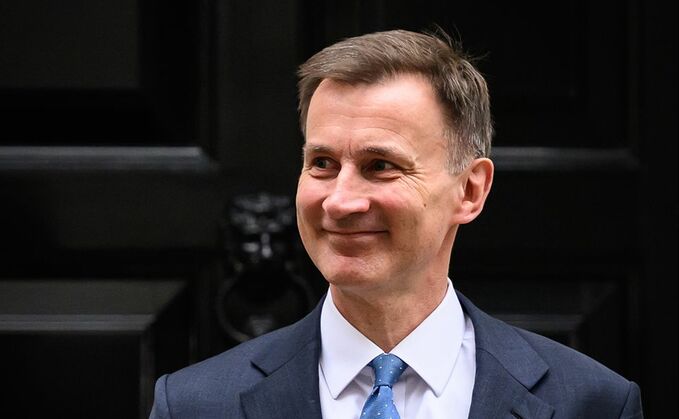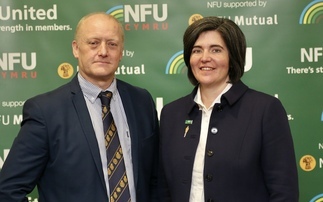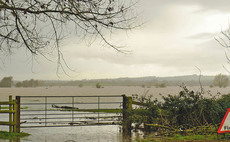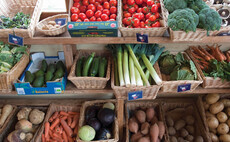
Chancellor Jeremy Hunt is due to deliver his budget this week
Speculation is mounting ahead of Chancellor of the Exchequer Jeremy Hunt's budget which is expected to be his final fiscal statement before the General Election which is due to take place this year.
Sean McCann, chartered financial planner at NFU Mutual,��has outlined some key asks which would benefit the nation's farmers.
Certainty over inheritance tax and ELMs
"Farmers will be hoping for overdue clarity around the application of Agricultural Property Relief (APR) alongside the Government's Environmental Land Management schemes (ELM) schemes said Mr McCann.
APR, he explained, can reduce or eliminate the inheritance tax liability on agricultural land with a central requirement being that the land is occupied for agriculture.
"Some of the schemes proposed under ELMs require land to be withdrawn from agricultural production which could mean the loss of relief and lead to larger inheritance tax bill, Mr McCann said. "Confirmation that land used for ELMs still qualify for APR is crucial - otherwise it will discourage farmers from taking part in the Government's schemes if they risk a future tax bill."
Cut Employers' National Insurance
This has been mooted by many observers as a way of boosting commerce. Mr McCann said any cut would send a ‘bold' and ‘positive' message to employers across all sectors.
"Employers' National Insurance is viewed by many businesses as a tax on employment. The current rate stands at 13.8 per cent on all earnings over £123 per week, in most cases.
"Mr Hunt cut National Insurance rates for both employees and the self-employed in his Autumn Statement, but left the rate paid by employers untouched. Although it would be expensive, reducing the rate could incentivise growth for employers."
Four predictions for personal finances
- More money in the pockets of workers
Although Prime Minister Rishi Sunak promised two years ago to reduce the basic rate of income tax from 20 per cent to 19 per cent, Mr McCann thinks it is doubtful Mr Hunt will choose to go down such an expensive route that could fuel inflation.
Instead Mr McCann said the Chancellor may opt to further reduce personal National Insurance contributions as it rewards those in employment, so it can be ‘billed as a boost for growth and productivity'.
‘'A cut to income tax would be more expensive as it would apply to savings interest and rental income as well as earnings, making it harder for the Chancellor to present it purely as a measure to boost productivity," he added.
"Employee's National Insurance was cut from 12 per cent to 10 per cent in January, and shaving another one or two per cent off it this spring could be on the cards."
- ��Thawing the 15-year freeze on inheritance tax
Mr McCann said: "Inheritance tax is one of the most feared taxes, so making changes in an election year could be a potential vote winner.
While he believed the Government is unlikely to abolish it completely, it could increase the tax-free threshold which has been frozen at £325,000 for the past 15 years.
"During this time property and investment values have rocketed, dragging an increasing number of families into the inheritance tax net," he said. "Had the £325,000 allowance kept pace with inflation, it would now be worth almost £500,000.
"Similarly, had the residence nil rate band that allows you to pass on up to £175,000 of the value of your home to your children or grandchildren, kept pace with inflation it would now be worth more than £200,000. This would mean a couple could pass on up to £1.4m free of inheritance tax. Increasing the tax-free amounts is likely to go down well with middle-class voters," Mr McCann added.
- ��Reforming the High Income Child Benefit Tax
When the High-Income Child Benefit Tax was introduced more than a decade ago, the £50,000 threshold was deemed a high income. However 11 years later, wage growth has dragged more and more families into this tax which is widely misunderstood and viewed by many as inherently unfair.
Mr McCann said: "The tax is levied on the highest earner in the household, for every £100 of income over £50,000 they must repay 1 per cent of the child benefit received, at £60,000 they must repay the full amount. If claiming for two children, this would amount to £2,075.������
"If the £50,000 threshold was uprated with inflation, it would now be £66,728. The Chancellor could ease the burden on squeezed families by finally increasing this long-frozen threshold.
He continued: "He could also fix the perceived unfairness of the tax. Currently two parents with income of £49,000 each would escape the tax whereas a sole earner in a household with an income of more than £50,000 would be caught. Assessing the tax on total household income would help address this divisive aspect of the tax."
- Tweaking the Personal Savings Allowance
Mr McCann said one of the by-products of higher interest rates has been increased tax bills for many savers.
"The personal savings allowance of £1,000 for basic rate taxpayers and £500 for higher rate taxpayers has been frozen for eight years which means more and more people are now paying tax on the interest from their savings," he said.
"Had these tax-free allowances kept pace with inflation they would now be worth more than £1,300 and £650 respectively.
"Restoring the value of the tax-free savings allowance would benefit the many older voters who rely on savings interest to supplement their income."
��





















